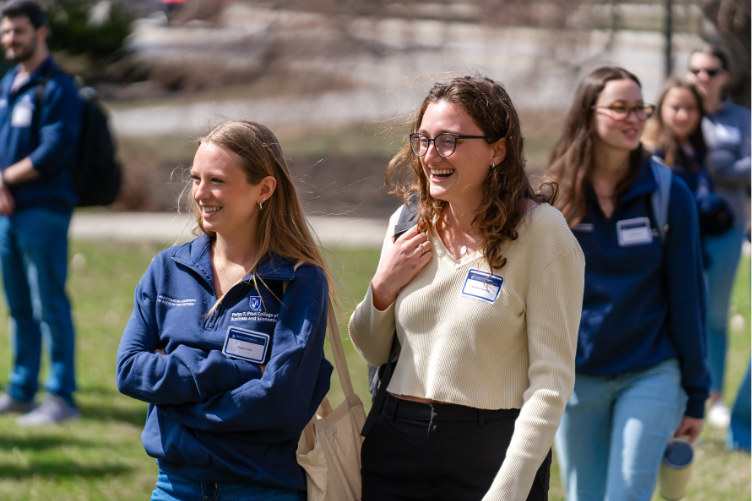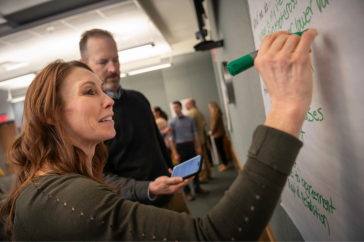
Accounting students Alyssa Crotty and AnnMarie Tremblay await scavenger hunt instructions at a recent team building event for current and new students accepted into Paul College's MSA Financial Leadership in Accounting Pathway.
How to Join the MSA FLA Pathway
-
Apply to the FLA Pathway (you must have a 3.2 GPA or higher to qualify)
Students typically apply in the spring of their sophomore year. Acceptance is determined by the program’s advisory board, with faculty input.
-
Apply to the MSA Program (separately)
Admission to the FLA Pathway does not automatically enroll students in the MSA program. All students must apply to the MSA program separately, usually the semester before beginning graduate coursework.
-
Most FLA students successfully transition into the MSA program, but admission is still reviewed by a faculty committee. Students not in the pathway can also apply directly to the MSA.
James Rogers arrived at UNH undecided about his career path, while Lyla Tulloch-Hernandez was "dead set" on studying marketing. Neither had any intention of pursuing accounting or a master’s degree.
Much has changed as both second-year students are now excited about accounting, with a clear path to a master’s degree as part of Paul College's MSA Financial Leadership in Accounting (FLA) Pathway.
“I never would have expected to be in a program in my second year of university where I'm surrounded by partners at the ‘big four’ and regional accounting firms who want to take us as soon as we leave school,” Rogers says.
As the program welcomes its second cohort of students, its impact is growing.
Building a Flexible Pathway
Launched in 2024, the FLA was designed to attract students to accounting by giving them an early start on skills, experience and connections needed for graduate study and professional success.
The program emerged from discussions between UNH alumni and faculty about increasing MSA enrollment and providing greater flexibility. The pathway allows students to create a personalized path to the MSA that accommodates various goals, whether pursuing internships, studying abroad or accelerating their timeline to graduation.
“Students can choose a summer or winter internship, full- or part-time, and complete the program in four and a half years through our accelerated track — or take the traditional five-year route if that works better for them,” says Scott Berube ‘02 ‘03G, MSA program director and principal lecturer.
The FLA also offers generous scholarships that reduce MSA tuition — often bringing costs down to in-state rates for out-of-state students or lower for residents. Students can earn dual credit for up to four master’s courses while they are undergraduates and attend events where additional scholarships are awarded, while gaining direct access to firm professionals through exclusive networking and mentorship opportunities.
“The professionals on our advisory board, many who are alums, are either managers or partners at their firms, and students have direct access to them,” Berube says. “Events combine professional development with fun — whether it's a campus-wide scavenger hunt, a ropes course at the Browne Center, a game-show style networking night or a formal etiquette dinner in Portsmouth. These experiences help students build soft skills and connect with firm professionals.”
Partnering firms include PricewaterhouseCoopers (PwC), Ernst & Young (EY), Baker Newman Noyes, Berry Dunn, Nathan Wechsler & Company, and new 2025 partners Raiche & Company and RSM.
Berube says that as more states consider lowering the CPA exam requirement from 150 credit hours (which often require credits beyond a bachelor’s degree) to a standard bachelor’s degree, the MSA FLA Pathway could become even more valuable as a way for students to stand out in a competitive job market.
Driven by Alum Support
As chair of the MSA advisory board, Abby Paul ’06, ’07G, a partner at PwC, played a key role in launching the pathway. Paul says by combining early access to sponsoring firms with a strong emphasis on professional development, the pathway helps students explore careers in accounting while strengthening the MSA program and its connection to industry.
“One of the key benefits is the unique access students get to our firms early on, which often leads to internship and long-term career opportunities,” Paul says. “We’ve designed this program to give students early exposure to careers in accounting while also investing in their long-term development. Ultimately, it's about building a strong pipeline of Wildcat accounting talent and setting our students up for lasting success.”
Paul emphasized that alums support the program because they believe it prepares students for success in accounting.
“Based on our own experience at UNH, members of the board all share the belief that our experience in the MSA played a pivotal role in preparing us for professional success,” Paul says. “The work ethic that comes out of UNH is unmatched — I’ve worked with students from a wide range of schools, and UNH consistently stands out.”
A Promising Start
 The first FLA cohort included about 50 students, with approximately 40 continuing in the program. More than 70 students applied for the second cohort, with 52 admitted this April.
The first FLA cohort included about 50 students, with approximately 40 continuing in the program. More than 70 students applied for the second cohort, with 52 admitted this April.
Michael Van Keuren ‘26 was part of the pathway’s first cohort and has already started some of his master’s courses and secured internships with KPMG in Boston this summer and PwC next winter.
"Having this program on my resume helped during the interview process. Being able to speak with accounting professionals early on gave me so much insight — like what kinds of internships to pursue, how to approach the process, and tips I wouldn’t have known otherwise,” Van Keuren says.
Emma Barsness ‘25 says participating in the pathway has been valuable in building her social skills.
“The MSA FLA program is filled with students and professors who are very supportive. I think being around people who make me comfortable has helped me interact with companies that would usually be daunting,” Barsness says.
Rogers and Tulloch-Hernandez are among the newly accepted students.
"I originally considered finance because I was drawn to investments and working with clients, but I realized accounting provides a strong foundation across many areas of business — including finance,” Rogers says. “That gave me the confidence that choosing accounting would offer more flexibility and options."
Tulloch-Hernandez is optimistic that the FLA will help build her network and confidence.
“I’ve already made so many new friends through this program, and that sense of community was a big reason I applied,” she says. “I’m excited to get to a point where I can recognize people at large companies and feel confident walking up to say hello and start a conversation.”
-
Written By:
Aaron Sanborn | UNH Paul College & CHHS | aaron.sanborn@unh.edu
















































